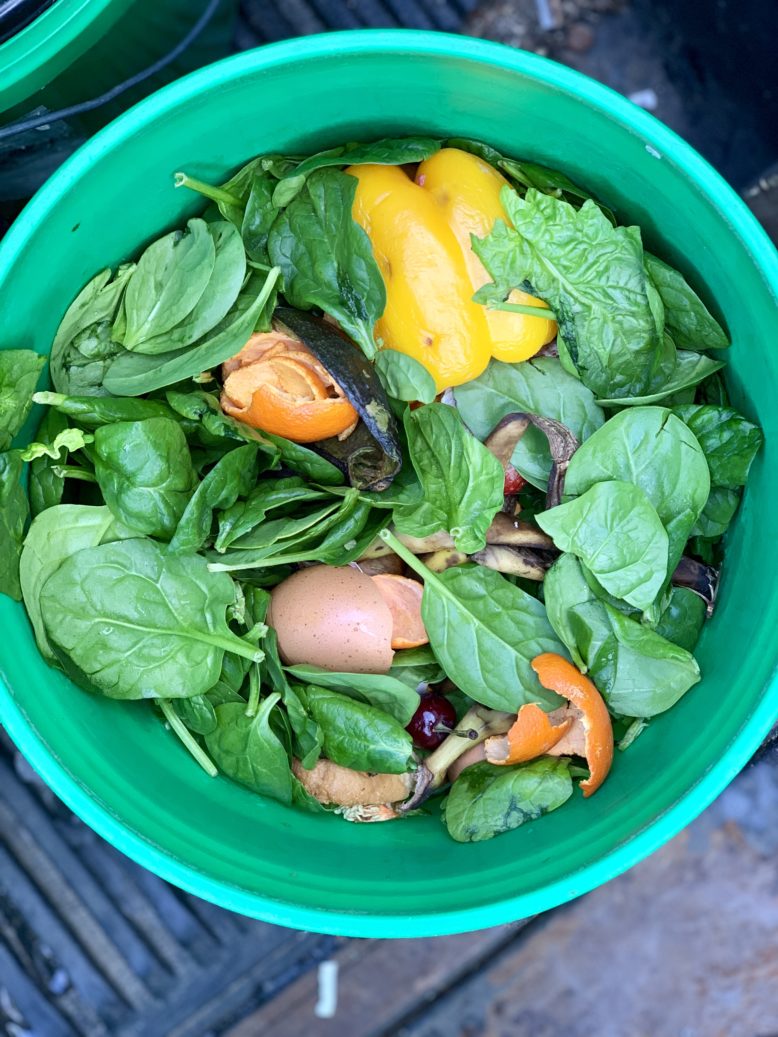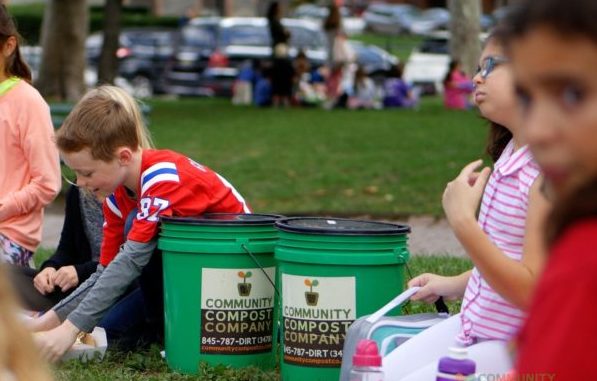
Food scraps in a Community Compost Co. five-gallon bucket. Photo courtesy of Community Compost Co.
Food waste is heating up.
As in, it’s literally contributing to the warming of our planet (food makes up a major chunk of what gets dumped in landfills). It’s also heating up in the sense that there’s a growing hunger to do something about it. While buying less food and fighting food waste in the kitchen are productive starts, some leftover food scraps are inevitable. After all, most modern home cooks and chefs don’t have the time to jam, pickle and repurpose every last peel or crumb.
Enter compost. The process, essentially nature’s recycling, takes food scraps and yard waste and turns them into an earthy, crumbly, darker-than-dirt material that gives soil a boost of extra nutrients. But doing it yourself at home can be close to impossible for urban dwellers or businesses without outdoor space (not to mention intimidating for those who do). For would-be composters in Hoboken and Jersey City, there’s Community Compost Company, a service that recycles subscribers’ cucumber skins, egg shells, apple cores and other food scraps for them.
It works like this: Similar to trash and recycling pick-up services, Community Compost Co. collects bins residents and restaurants place outside weekly or bi-weekly with their truck. They then pile up this discarded food at their one-and-half acre facility in the Hudson Valley, shepherding the natural process of creating compost out of broken down food scraps.
That’s 1.6 million pounds—and counting—of scraps diverted from landfills, says Andrea Rodriguez, Community Compost’s sales and marketing manager. Now a team of six women, all of whom Rodriguez describes as “passionate environmentalists,” the business started as the brainchild of New Jersey native Eileen Banyra. A city planner with three decades of experience (and a New Jersey native), Banyra switched gears in 2013, getting Community Compost off the ground through an incubator program in New Paltz, New York.
Two years later, Banyra wanted to expand beyond the Hudson Valley. She landed on Hoboken and Jersey City—both diverse, green-minded, urban communities with lots of New York transplants familiar with composting—as starting points in her home state. Drumming up interest by creating compost drop-offs at farmers markets, they then launched the pick-up service, handing out their signature five-gallon green buckets to home cooks (there are currently close to 300 household subscribers; it costs $29 or $19 per month for weekly or bi-weekly pick-up respectively.)

You may see Community Compost Co. buckets more around Hoboken and Jersey City. Photo courtesy of Community Compost Co.
Restaurants and chefs, too, have been an important part of Community Compost’s growth. In Hoboken, the company has partnered with the city to offer free compost pick-up for restaurants twice a week (other businesses and schools are eligible as well). Picking up scraps from eateries such as Choc-O-Pain, cooking school Hudson Table, Black Rail Coffee, Grand Vin and Simply Juiced has been a natural match. “Chefs really see the importance of good, healthy ingredients,” Rodriguez says. “With composting, you’re only helping to create more awesome ingredients to cook with later on.”
Bucket & Bay Craft Gelato owner Jen Kavlakov saw working with Community Compost as the logical way to come full circle, as she says her small-batch gelato shop, which opened in Jersey City in 2015, places a premium on sourcing local, seasonal ingredients. Community Compost’s first restaurant client in Jersey City, Kavlakov has recommended them to other area cafes and restaurants who want to recycle kitchen prep scraps and customer leftovers. “It’s about sustainability,” she tells peers. “It’s about doing what is right for the future.” In Jersey City, Subia’s Vegan Cafe, Barcade, and Busy Bee Organics also compost with Community Compost Co.
More communities, restaurants and home cooks are clamoring to get in on compost pick-up or communal drop-off locations, Rodriguez says. But she says there are steep hurdles for Community Compost and other small and mid-size businesses like theirs to take root or expand.
Just obtaining permits to recycle food waste in New Jersey is a costly, inflexible and lengthy process, explains Matthew A. Karmel, founding board member of the NJ Composting Council and an attorney in the Environmental Practice Group at Riker, Danzig, Scherer, Hyland, Perretti LLP in Morristown. By his count there are only four facilities in the state with traditional food waste permits and an additional three with temporary research, development and demonstration permits, which Karmel says is not nearly enough when compared with the growing demand for such services in the state. Legislation passed at the end of June does require establishments generating large quantities of food waste to recycle this waste. The loophole? Landfills and incinerators count as recycling centers. In light of this, environmental and industry groups like Karmel’s are urging Governor Phil Murphy to veto the measure.
Because Community Compost Co. takes the scraps they collect over the border to a Kerhonkson, New York farm, they avoid much of this tricky legal landscape (New Jerseyans’ trash often gets carted to landfills much further away, Rodriguez is quick to point out; Hoboken’s garbage, for example, ends up in West Virginia), but Rodriguez says they are fighting for change in New Jersey so “there are more options, and more and more communities can get on board with composting.”
In the meantime, she says their focus is on their current New Jersey and New York locations and on educating communities and food businesses. They partner with community gardens and farmers markets, sell their compost at a handful of area markets and garden stores (they’re bagged under the name Hudson Soil Co.; subscribers can also get a container of compost back each fall and spring) and have worked with concerts, film and TV productions and festivals in New Jersey to compost catering leftovers, too.
Above all, Rodriguez says she encourages people “to try to not look at food as garbage.” Is composting, at home or via pick-up and drop-off services, extra effort? Yes. Does it take some getting used to? Sure. But, she says, “it’s really a resource that helps our soil to grow healthy food for us to eat again.”



